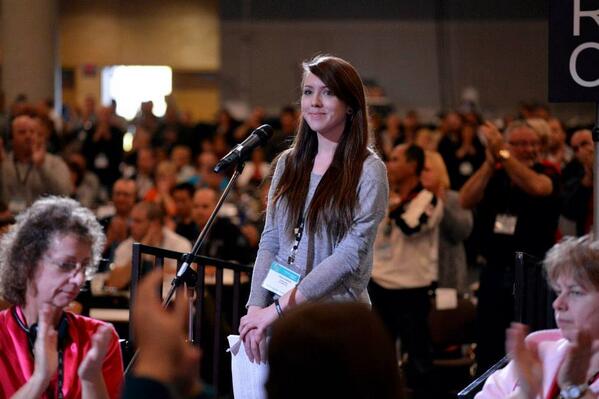Lydia Dobson wasn’t planning on running for the presidency of the Canadian Union of Public Employees (CUPE) when she arrived at her first ever national convention October 21. She had only been a member of CUPE Local 4600, which represents teaching assistants and contract instructors at Carleton University in Ottawa, for just over a year, though in that time she had become the recording secretary of the local.
But when she arrived at a caucus for young workers on the first night of the convention, she found there were only three people in attendance in a room that could comfortably fit over 100.
“That triggered my concern for the young workers issues,” she explained. “Just looking around the physical space and the people I was seeing — I really didn’t recognize many young workers.”
Frustrated, she felt that she had to do something to make her voice heard. So two days later she was the surprise nominee for the presidency of the largest public union in Canada. It was a protest against what she feels is the lack of representation of young workers within CUPE. It’s a concern shared by other workers within the union.
“I think there’s a disconnect between the problems young workers are facing and the things the national union and provincial union are focused on,” said Trish Everett, the president of CUPE local 2278, UBC’s Teaching Assistant and English Language Institute Union.
Most of local 2278’s over 3,000 members are under 30. Everett estimated that about a quarter to a third of her membership turns over every year as they graduate and move on to other employment or schools.
Making sure members are aware they are in an union, much less that there are leadership opportunities in it, can be challenging. “I discovered I was in a union when I got a health care rebate check,” explained Everett. “I think that’s a pretty common experience.”
Local 2278, galvanized by CUPE’s announcement that 2013 was the year of the young worker, sponsored a pair of resolutions that were presented at the national convention. One would have required that a young worker representative be added to each district’s executive board, and another that would have amended the CUPE constitution to include a young worker as part of the National Executive Board. A similar resolution was brought forward by a different local at CUPE’s BC convention in April, but they were met with some resistance from other members.
“There were a lot of people saying that it was a tokenist position, that it was unnecessary,” said Everett. “A lot of people saying, ‘I was a young worker once so I know what the issues of young workers are,’ even though issues are radically different now.”
The negative reaction was surprising to Everett, who believed the idea made perfect sense. “I’ve never seen a reaction quite like what we saw in BC,” she said. “Until, of course, we went national.”
“There was a speaker that came forward and the words that came out of their mouth were ‘we wouldn’t want to promote a sense of entitlement,'” recalled Dobson. “Right there, that was when I felt disenfranchised.” Everett, despite waiting by the microphones to present the resolution her local sponsored, wasn’t able to speak to it after another worker beat her to the podium.
CUPE president Paul Moist remembers the debate on the floor of the convention as being healthy. “There was a standing ovation at the end of the debate [before the resolution failed],” he said. “I thanked everyone for the tone of the debate.”
He wasn’t surprised that some young workers are frustrated. “It’s a huge organization and it’s a very political environment.” But he noted that he felt both the resolution and Dobson’s bid for presidency helped educate members about the issues youth workers are facing. Plus he was pleased to have some competition. “I’d rather win in a contest than be acclaimed to office.”
While Dobson did not win, she did score an unexpected victory. “I honestly thought I would get 30 votes, and I would have been happy with that,” she said. She was understandably shocked when she collected over 300 votes, compared to slightly over 1400 for Moist.
Nor was Everett disappointed by the result of the vote on the resolutions. “At the end of the day most of us were quite satisfied with how the convention went,” she said. “It’s about having important conversations and shaping the union we want to belong to.”
She and other young workers nationwide are planning to continue to introduce similar resolutions at provincial, as well as continuing efforts to organize young workers at locals. “Eventually we will reach a point where you cannot deny the young workers’ voice anymore.”
Both Everett and Dobson hope that the events of the national convention build momentum for young workers in CUPE.
“I feel like it’s kind of just beginning,” said Dobson. “I think that CUPE has a lot of work to do and it would be great if it’s more accessible to young workers — it’s really important that everyone is represented.”



